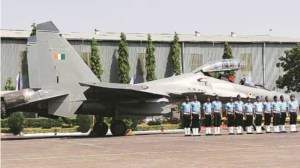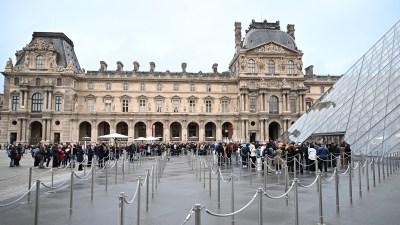What fuelled Parkash Singh Badal’s rise: Control over the Sikh vote base
After Independence, the Shiromani Akali Dal launched a movement for a separate state, giving the slogan of 'Punjabi Suba'.
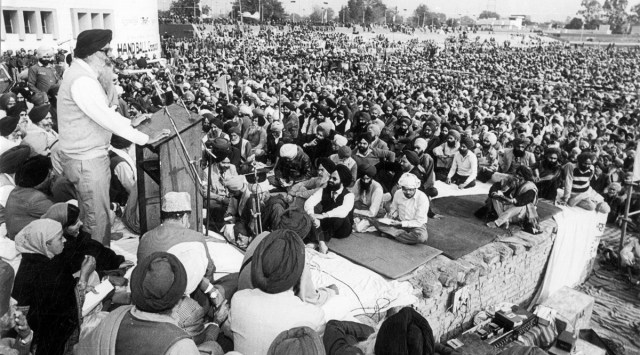 Former Punjab Chief Minister Parkash Singh Badal addresses a gathering. (Express Archive)
Former Punjab Chief Minister Parkash Singh Badal addresses a gathering. (Express Archive) While most of his political life would be spent in contest with the Congress, Parkash Singh Badal contested his first election on the Congress symbol.
There was a history to it. Soon after Independence, the Shiromani Akali Dal launched a movement for a separate state of Punjabi-speaking people, giving the slogan of ‘Punjabi Suba’. The Congress government banned the slogan, and the conflict reached a point that the police entered the Golden Temple in July 1955.
Later, both the Congress and Akalis softened their stand and tried to work their way towards a ‘Regional Formula’ to end the dispute. For a brief while, the Akalis pondered merger into the Congress to realise this, and for the “greater good of Sikhs, Punjab and country”. A Haryana front which backed the Regional Formula had already merged with the Congress.
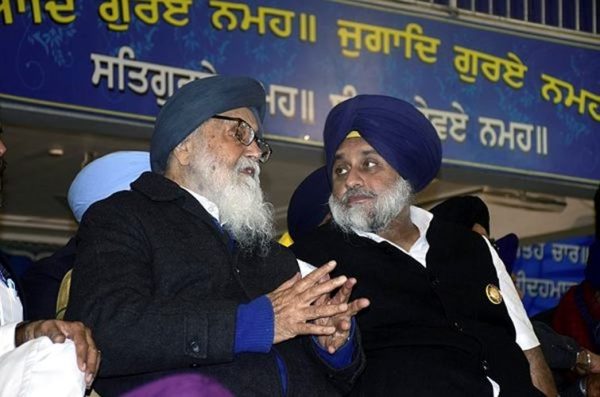 SAD patriarch and former CM Parkash Singh Badal and SAD President Sukhbir Singh Badal during the ‘panthic gathering’ at Manji Sahib Diwan Hall in Golden Temple complex in Amritsar. (Express photo by Rana Simranjit Singh)
SAD patriarch and former CM Parkash Singh Badal and SAD President Sukhbir Singh Badal during the ‘panthic gathering’ at Manji Sahib Diwan Hall in Golden Temple complex in Amritsar. (Express photo by Rana Simranjit Singh)
On September 30, 1956, the Akali Dal passed a resolution to not have any political agenda, leaving that to the Congress. It was during this brief detente that Badal contested from Malout, and won along with many other Akalis fighting on Congress ticket.
Then, on March 15, 1960, the working committee of the Akali Dal asked all its members who had contested on Congress ticket to resign from the Assembly, but Badal refused. This was as much a result of the Akali Dal’s internal tussle, in which Badal was seen as close to Sant Fateh Singh against his rival, Master Tara Singh.
The 1967 elections led to a hung Assembly and three alliance governments fell before Badal eventually was picked as CM at the age of 43, on March 26, 1970. When the Jan Sangh, which was supporting his Akali government, pulled out, the Congress came to Badal’s rescue, lending support from outside in July 1970.
While a strong believer of federalism, Badal didn’t entertain any talk of a separate “Sikh homeland” and snubbed senior Akali leader Jagjit Singh for suggesting the same. However, the internal factions within the Akalis eventually forced his government out on June 13, 1971.
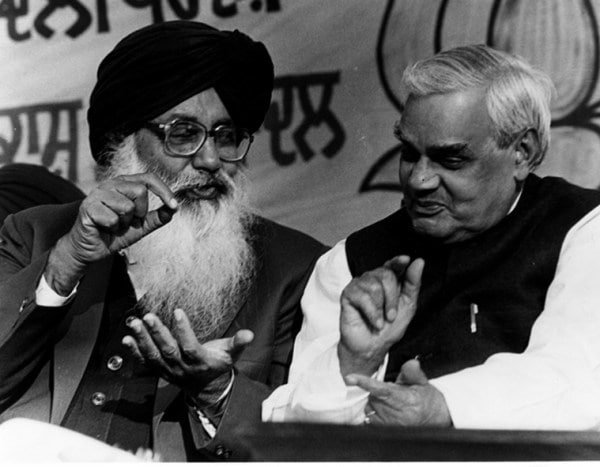 Former Punjab CM Parkash Singh Badal with former PM Atal Behari Vajpayee. (Express archive photo)
Former Punjab CM Parkash Singh Badal with former PM Atal Behari Vajpayee. (Express archive photo)
Seen as a “secular” voice among the Akalis, he had said after being sworn in as CM for the first time that “my government would try to restore communal harmony in the state and re-establish complete Hindu-Sikh amity”. This stand was severely tested when the Army entered Golden Temple as part of Operation Blue Star to capture Jarnail Singh Bhindranwale.
While he continued to believe in Sikh-Hindu amity, he never forgave the Congress for this, and would keep reminding people about “the role of the Congress” in 1984, soon to be followed by Prime Minister Indira Gandhi’s assassination and anti-Sikh riots.
He was accused of calling Sikh soldiers to mutiny from the Indian Army over Operation Blue Star and was jailed for sedition.
After coming out of jail, Badal attended bhog ceremonies of Sikh militants killed in police encounters and boycotted the 1992 Assembly elections. But, while he made some polite noises about Khalistan, his politics never moved in a separatist direction.
Badal formed his third government in 1997, and in 1999, took full control of the SGPC, managing to remove Gurcharan Singh Tohra, who had headed it for more than two decades.
But again, he ignored Sikh bodies who wanted him to take action against police officers who allegedly violated human rights after 1984. This allowed Amarinder Singh to rally Sikh votes behind him, even though he was in the Congress, which was held responsible for 1984.
Badal’s tenure that began in 2007 would be remembered for the clash between Sikhs and Dera Sacha Sauda. Badal failed to prosecute Dera Sacha Sauda head Gurmeet Ram Rahim over allegations of sacrilege levelled by the Akal Takht.
In a first for the state, Badal managed to return to power in 2012. During this tenure, the Badal-controlled SGPC allowed construction of a memorial for Bhindranwale, other militants and Sikhs killed during the Army action in 1984. It was after a long time that Badal was accused of going soft on Sikh hardliners.
Two years later, came the sacrilege incidents of 2015, which led to the party’s embarrassing defeat in 2017. A year later, Badal and other Akali leaders sought to offer an “apology” at Golden Temple over this by cleaning shoes and washing utensils.
But in 2022, the Akali Dal suffered its worst-ever defeat. And Badal’s death comes at a time when the party is struggling to get its Sikh vote bank back.


